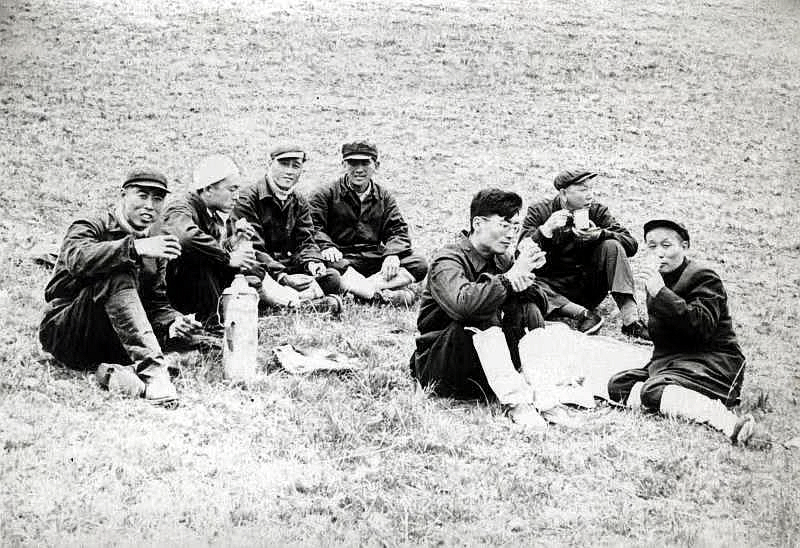
Wang Chengxin (second from the left) and his colleagues in Menyuan, a plague-stricken county in Qinghai province. (Photo provided by Chinese Preventive Medicine Association)
This is a story about one of China's leading rodent control experts who has been dealing with rats for 64 years.
BEIJING, Sept. 19 (Xinhua) -- By 2019, Wang Chengxin has been dealing with rats for 64 years.
But in 1955, when young Chinese college students believed they should "go where the motherland needs us most," Wang, then 22 and a pharmaceutical graduate, felt lost at first for his job assignment.
He had been studying hard to make medicines to help people, but was assigned to make deadly poisons for rats.
On reporting to a plague prevention and control institute in northeast China, Wang learned that rat-borne plague, which killed millions of people in Europe in the Middle Ages, still flared up in some parts of China.
He told himself he "couldn't be a deserter" and embarked on the journey.

Graduation photo of Wang Chengxin (Photo provided by Chinese Preventive Medicine Association)
LEARNING FROM RATS
With no experience or training, Wang decided to learn from the rats, especially those smart ones, from the beginning.
During his first visit to a plague-stricken prairie, Wang borrowed a wicker basket more than a meter high from local villagers, and put it near rat holes.
Like a Tom and Jerry cartoon, Wang, like Tom, hid himself in the basket and observed between the slits.
"It sounds silly, but it really worked," Wang recalled in an interview with Xinhua. The rats got used to the basket after about 30 minutes and started to move as normal.
The covert observation lasted five to six hours every time. Within days, Wang learned how different rodents respond to traps and baits as well as their eating habits.
WALK WITH RATS
During his first 10 years on the job, Wang studied dozens of rodents including rats and marmots, which can carry the Yersinia pestis plague bacteria, and tested more than 1,000 pesticides.
According to the Chinese Center for Disease Control and Prevention, from 1950 to 1954, an average of 1,372 plague cases were reported annually in China.
In the late 1950s, China launched large-scale rodent control campaign in plague-stricken provinces.
Before the days of GPS and drones, Wang said, field work, on a prairie for instance, was mainly done on foot.
He once led a rodent control team of 20 people to a 4,000-hectare pasture. They stood in a row 5 to 10 meters apart and walked back and forth, dropping pesticide.
To cut the number of rats in any 10-hectare area below two, Wang and his team walked 25 to 30 km every day, for 100 days.
They wore through a pair of Liberation shoes, the commonly-worn canvas sneakers of the time, every four weeks, and completed the mission.
From 1955 to 1979, the average number of plague cases plunged to 20.7 each year.

A meeting on Wang Chengxin's legal battle against Qiu Mantun was held at Chinese Preventive Medicine Association on March 29,1995. "Science will triumph over ignorance" was written on the blackbord. (Photo provided by Chinese Preventive Medicine Association)
SCIENCE WITH RATS
In the 1980s, Wang was recognized as one of China's leading rodent control experts, and he started to focus on advising and training young researchers.
His expertise drew him into a 30-month legal battle against the "King of the Rat Killers".
In August 1992, Wang lost a defamation lawsuit to Qiu Mantun, whose rat bait "Three Steps Down" created a national sensation in the late 1980s.
According to Wang, Qiu hired him as a consultant, but Wang found Qiu's poisons contained prohibited ingredients, such as fluoroacetamide, a compound dangerous to a range of mammals including humans.
Wang and four other scientists wrote an article calling for scientific methods of rat control, and told of cases of human and livestock poisoning from Qiu's poisons.
In February 1995, a court in Beijing overturned the libel verdict, in a ruling hailed as the "protection of the dignity of science" and "the triumph of science over ignorance."
"In rat control, you can't succeed overnight. If there are 100 rats on a farm, the five that survive a quick attack are the smartest ones. They have the whole farm to themselves and they will come back," he said.
"You can't sacrifice long term goals for temporary success. You must respect science. That's my advice for young scientists," he added.■



